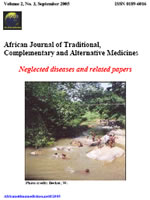
|
African Journal of Traditional, Complementary and Alternative Medicines
African Ethnomedicines Network
ISSN: 0189-6016
Vol. 13, No. 4, 2016, pp. 8-14
|
 Bioline Code: tc16081
Bioline Code: tc16081
Full paper language: English
Document type: Research Article
Document available free of charge
|
|
|
African Journal of Traditional, Complementary and Alternative Medicines, Vol. 13, No. 4, 2016, pp. 8-14
| en |
THE EFFECTS OF Syzygium aromaticum  -DERIVED TRITERPENES ON GASTROINTESTINAL GHRELIN EXPRESSION IN STREPTOZOTOCIN-INDUCED DIABETIC RATS -DERIVED TRITERPENES ON GASTROINTESTINAL GHRELIN EXPRESSION IN STREPTOZOTOCIN-INDUCED DIABETIC RATS
Luvuno, Mluleki; Mbongwa, Hlengiwe Prosperity & Khathi, Andile
Abstract
Background: Diabetic polyphagia has been associated with elevated plasma ghrelin levels in experimental type 1 diabetes. This
increase in food consumption contributes to chronic hyperglycaemia in diabetes thus contributing to the development of micro- and
macrovascular complications. We have reported that plant-derived oleanolic acid (OA) and maslinic acid (MA) reduce blood glucose
levels, in part, through the inhibition of intestinal carbohydrate hydrolyzing enzymes and glucose transporters. However, their effects
on food intake and plasma ghrelin concentrations are unclear. Accordingly, we investigated the effects of these triterpenes on food
intake and ghrelin expression in streptozotocin-induced diabetic rats.
Material: The effects of OA and MA on blood glucose concentration; food and water intake were monitored over five weeks after
which plasma ghrelin concentrations were measured. Additionally, the expression of ghrelin in the various sections of the GIT was
determined using Western blot analysis.
Results: Ghrelin concentrations in untreated STZ-induced diabetic rats were significantly higher in comparison to the non-diabetic
control. Interestingly, the administration of OA and MA reduced food intake, blood glucose levels and plasma ghrelin levels in STZinduced
diabetic rats. This was further complemented by significant reductions in the gastrointestinal expression of ghrelin
suggesting that the anti-diabetic properties of these triterpenes are mediated, in part, through the reduction of food intake and the
modulation of ghrelin expression.
Conclusion: The findings of the study suggest that the control of food intake through the reduction of ghrelin expression by plantderived
OA and MA may constitute an avenue of glycaemic control in diabetes mellitus.
Keywords
diabetes mellitus; ghrelin; Syzygium aromaticum; triterpenes; oleanolic acid; maslinic acid
|
| |
© Copyright 2016 - African Journal of Traditional, Complementary and Alternative Medicines
Alternative site location: http://journals.sfu.ca/africanem/index.php/ajtcam
|
|
